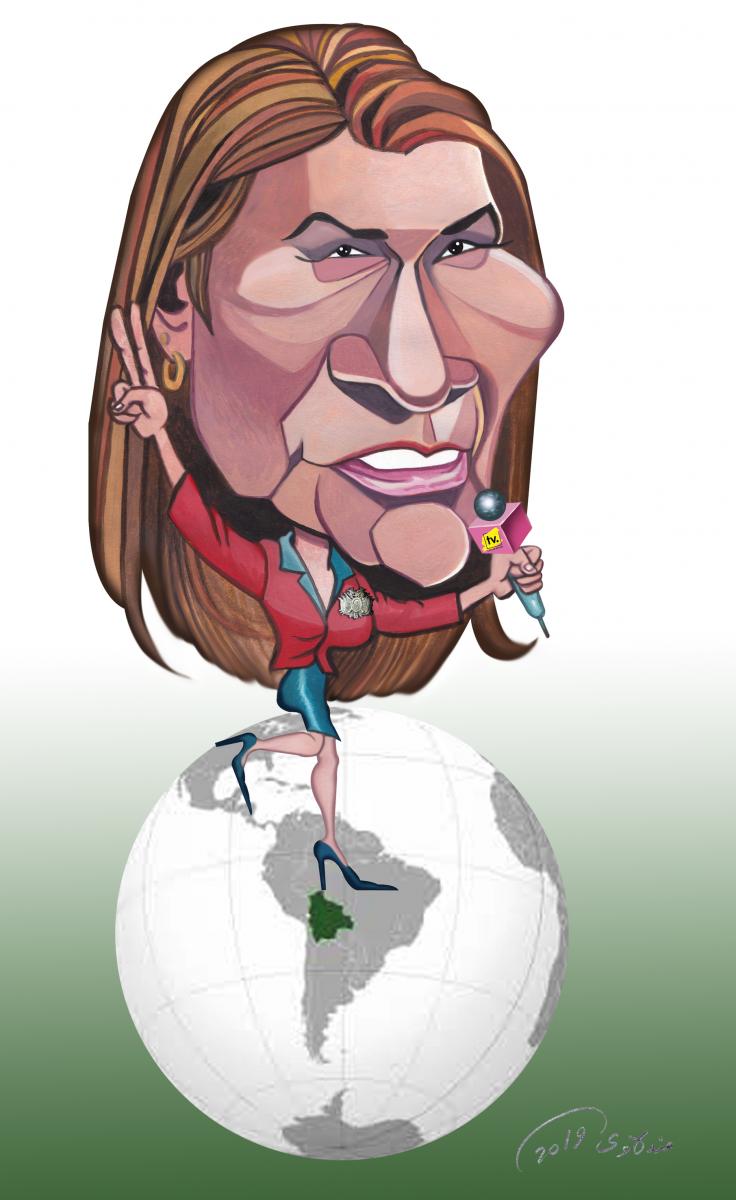
Jeanine Añez was the senate vice president and little-known even in her native Bolivia before longtime President Evo Morales resigned on 10 November 2019 when the Bolivian armed forces, the National Police Force, opposition parties, and anti-government protesters overthrew Morales’ socialist government. With Morales and other top officials in the line of succession gone, Añez used a constitutional article to elevate herself to interim president. Now, amid a serious political crisis, she finds herself trying to hold Bolivia together long enough to organise fresh elections, as Morales, the country’s most powerful political figure and Bolivia’s leader for 14 years, vows to return after quitting and fleeing to Mexico.
Añez was born in Trinidad, Bolivia on 13 August 1967. She became a lawyer in 1991 and campaigned against gender violence. She then worked as a television presenter and media director at Totalvision. Añez served in the Constituent Assembly for the drafting of a new constitutional charter from 2006 to 2008. In 2010, she became a senator for Plan Progress for Bolivia – National Convergence (PPB-CN), a right-wing coalition and the country's largest opposition force following 2009 elections. She was also named second deputy leader in line with a tradition that all parties be represented in the top posts.
In the 2010-2015 period, Añez became a fierce opponent to the construction of the road through the heart of the Indigenous Territory and Isiboro Secure National park (Tipnis), a Morales project that received a strong response from indigenous groups. In her second term as a senator, since 2015, she focused legislative work to prevent femicide and violence against women.
Now a member of the minority conservative political group, Democratic Unity, she is Bolivia’s 66th president and the second woman to hold the post after Lidia Gueiler Tejada, who also held the job on an interim basis in 1979-1980. The parliamentary session to appoint Áñez was boycotted by lawmakers from Morales's leftist Movement for Socialism party, who said it was illegitimate. Bolivia's highest constitutional court backed her assumption of power.
Añez has promised to hold fresh elections as soon as possible and that she will accept the result, even if voters pick another candidate. "I am going to work for you all, because Bolivians deserve to live in peace and never have their vote stolen again," she vowed to the Bolivian people immediately after assuming office, in a clear swipe at Morales and the election fraud allegations against him. The former president, however, refuses to go quietly. Writing on Twitter from Mexico, he condemned the "sneakiest, most nefarious coup in history" and lawmakers from his party, who hold a majority in Bolivia's legislative assembly, have threatened to nullify her appointment.
Añez’s new cabinet has meanwhile attracted some criticism for failing to include a single indigenous member, despite indigenous groups making up 40 percent of the country's population, ginning up controversy over racist tweets she posted in 2013. The posts — later deleted — described and ridiculed new year celebrations by the Aymara indigenous community (“Nobody can replace God!”) as “satanic.” In another tweet, she questioned their reasons for going barefoot. Morales was widely seen as Bolivia's first indigenous president and still elicits major support from these groups, who now fear hard-won gains may be reversed.
But Morales’s forced resignation has not led to the “restoration of democracy” in Bolivia, as some of those who supported his ouster claimed, but to the rise of a far-right regime of terror. “Áñez is turning Bolivia into a far-right military dictatorship. The regime’s vindictiveness, fomentation of racist speech and action, repression of political opponents, willingness to kill peaceful protesters, and flagrant dismantling of accountability mechanisms that protect human life and basic freedoms are deeply disturbing,” wrote The Washington Post. More than 30 people have died in clashes between protesters and security forces since the October election. However, most have died since Morales stepped down.







